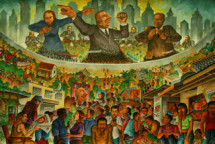Ideas into movement
Boost TNI's work
50 years. Hundreds of social struggles. Countless ideas turned into movement.
Support us as we celebrate our 50th anniversary in 2024.

How is green grabbing facilitated by ‘authoritarian populist’ governments in Brazilian Amazonia, and how are indigenous peoples fighting back?

Green grabbing, the appropriation of land and resources for ostensibly environmentally sustainable purposes, tends to be understood as being facilitated mainly by ‘neoliberal’ governments. Yet our case study from the Saracá-Taquera National Forest, Brazilian Amazonia, demonstrates how green grabbing can also be facilitated by ‘authoritarian populist’ governments, here the Workers Party (PT) under Lula and Dilma 2003-2016. We focus on the Public Forests Management Law (LGFP) of 2006 which enables Forest Stewardship Council (FSC) certification for ‘sustainable forestry’ concessions within National Forests (FLONAS). FLONAS are a kind of conservation unit (UC), which in Brazil is in the ‘sustainable use’ category of protected area, permitting industrial exploitation of natural resources, mostly timber and minerals. FLONAS are frequently located in territories occupied by indigenous, quilombola (Afro-descendent) or traditional (riberinho) communities.
We argue that the implementation of FST sustainable forestry concessions in FLONAS and other UCs is a form of green grabbing, in this case occurring through and legitimated by authoritarian populism, justified by way of compensation in the form of ‘development’ projects that provide basic social rights to which communities are constitutionally entitled anyway. In the face of both such ‘development’ projects and the expansion of mining and logging ventures, riberinho and quilombola communities of FLONA Saracá-Taq uera have mobilized and resisted politically, in part by articulating collective identities in defence of their territories. This novel modality of political organisation is a seeming break from Rural Workers Unions and Ecclesial Grassroots Communities of the ‘70s and ‘80s, which, especially since the 1998 constitution, have been superseded by new movements based on ethnic and territorial criteria. These new forms of emancipatory rural politics are likely to be critical in resisting ongoing attempts by the current Temer government to roll back Amazonian peoples’ territorial rights in order to facilitate intensified expropriation of their lands and resources.
This paper was presented at the Emancipatory Rural Politics Initiative (ERPI) 2018 Conference: "Authoritarian Populism and the Rural World"